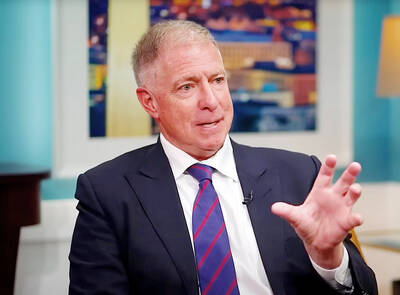The indictment of five senior officials of the Democratic Progressive Party (DPP) on Friday caused a political earthquake within the party and will likely cause an internal power shift.
Prosecutors from the Special Investigation Task Force indicted Vice President Annette Lu (
Lu is the nation's first vice president to be indicted, while Yu's indictment caught the chairman, who was campaigning for the party in Toronto, Canada, at the time, by surprise and forced him to make the immediate but inevitable decision to resign.
DPP presidential candidate Frank Hsieh (
The immediate question facing the party is who will take over as chairman, a key role in terms of coordinating between the Presidential Office, party headquarters and Hsieh's campaign ahead of next March's presidential election.
Such a role is of great importance, more now than ever, given that DPP headquarters and Hsieh's campaign have been at odds over whether the party's final "normal country" resolution should stipulate "Taiwan" as the future title of the nation.
The resolution is scheduled to be passed during the party's national congress on Sunday.
Immediately after prosecutors' announcement of the indictments on Friday, DPP caucus whip Ker Chien-ming (
Political analysts disagree.
"This is the worst choice [for the president]," said Lo Chih-cheng (
"The most important thing for Chen to do now is to fulfill his role as president and establish his legacy, so that he can conclude his eight years in office with a perfect ending," Lo said.
He said Chen could face a dilemma if the DPP does not fare well in January's legislative elections.
Chen Chao-jian (陳朝建), an assistant professor of public affairs at Ming Chuan University, also feels the president would risk his legacy by becoming the chairman again. This is because party chairman has to shoulder responsibility for the party's electoral performance, he said.
"Chen Shui-bian may become the [DPP's] sinner if the party loses both elections," Chen Chao-jian said.
Having the president as chairman may also blur the distinction between the administration and the party, Lo said.
If the president were to become DPP chairman again, the fact that he controls the government as well as the party would leave him without a buffer zone to "shield him from US pressure" against actions taken by the party such as the proposed referendum on UN membership under the name "Taiwan," Lo said.
Both Lo and Chen Chao-jian said Hsieh, while not facing charges, faces a dilemma during the potential power struggle within the party.
"If the president takes over the DPP chairmanship, the next presidential election will become a duel between Chen Shui-bian and [Chinese Nationalist Party (KMT) presidential candidate] Ma Ying-jeou (馬英九)," Chen Chao-jian said.
He said any interference by the president in Hsieh's presidential campaign would be obvious under these circumstances, and could end up "marginalizing" Hsieh in the campaign.
Lo agreed, saying that the president has always been better at setting political agendas than Hsieh.
"It is impossible for Hsieh to ask Yu to stay on as party chairman because Ma resigned [as KMT chairman] over his indictment in the special allowance case," Chen Chao-jian said.
"The best choice is to have someone from his own [Hsieh's] campaign assume the chairmanship, but this violates the party's regulations ... therefore, Hsieh cannot but agree to having Chen Shui-bian as head of the party," Chen Chao-jian said.
Lo said Hsieh had dealt with the indictment of Yu "inappropriately," referring to Hsieh's promise on Saturday that if elected he would push for an amnesty for government officials under investigation over their special fund expenditures.
Hsieh's move had distanced himself from Lu, Yu and Mark Chen, which has contributed to the divisions within the DPP and harmed his personal image, Lo said.
Hsieh's support of Yu's resignation also left him no maneuvering room in terms of other investigations he faces, Lo said.
However, Tseng Chien-yuan (
Tseng said Hsieh was proposing a solution not just to single cases but to a "universal problem inherent in traditional ethnic Chinese politics."
"This problem has turned our judiciary into a tool of political wrangling," Tseng said, adding that Hsieh's proposal showed the DPP candidate had done some thinking.

A total lunar eclipse coinciding with the Lantern Festival on March 3 would be Taiwan’s most notable celestial event this year, the Taipei Astronomical Museum said, urging skywatchers not to miss it. There would be four eclipses worldwide this year — two solar eclipses and two lunar eclipses — the museum’s Web site says. Taiwan would be able to observe one of the lunar eclipses in its entirety on March 3. The eclipse would be visible as the moon rises at 5:50pm, already partly shaded by the Earth’s shadow, the museum said. It would peak at about 7:30pm, when the moon would

DEFENSE: The US should cancel the US visas or green cards of relatives of KMT and TPP lawmakers who have been blocking the budget, Grant Newsham said A retired US Marine Corps officer has suggested canceling the US green cards and visas of relatives of opposition Taiwanese lawmakers who have been stalling the review of a proposed NT$1.25 trillion (US$39.7 billion) special defense budget. The Executive Yuan has proposed the budget for major weapons purchases over eight years, from this year to 2033. However, opposition lawmakers have refused to review the proposal, demanding that President William Lai (賴清德) first appear before the Legislative Yuan to answer questions about the proposed budget. On Thursday last week, 37 bipartisan US lawmakers sent a letter to Legislative Speaker Han Kuo-yu (韓國瑜), the heads

A New York-based NGO has launched a global initiative to rename the nation’s overseas missions, most of which operate under the name "Taipei," to "Taiwan Representative Office (TRO)," according to a news release. Ming Chiang (江明信), CEO of Hello Taiwan, announced the campaign at a news conference in Berlin on Monday, coinciding with the World Forum held from Monday through Wednesday, the institution stated in the release. Speaking at the event, Democratic Progressive Party Legislator Huang Jie (黃捷) said she believed this renaming campaign would enable the international community to see Taiwan

TOO DANGEROUS: The families agreed to suspend crewed recovery efforts that could put rescuers in danger from volcanic gases and unstable terrain The bodies of two Taiwanese tourists and a Japanese pilot have been located inside a volcanic crater, Japanese authorities said yesterday, nearly a month after a sightseeing helicopter crashed during a flight over southwestern Japan. Drone footage taken at the site showed three bodies near the wreckage of the aircraft inside a crater on Mount Aso in Kumamoto Prefecture, police and fire officials said. The helicopter went missing on Jan. 20 and was later found on a steep slope inside the Nakadake No. 1 Crater, about 50m below the rim. Authorities said that conditions at the site made survival highly unlikely, and ruled